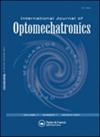Correlation of accommodation and lens location with higher-order aberrations and axial length elongation during orthokeratology lens wear
IF 2.3
3区 工程技术
Q1 ENGINEERING, ELECTRICAL & ELECTRONIC
引用次数: 1
Abstract
Abstract This study examined the effects of overnight orthokeratology (OK) on higher-order wavefront aberrations (HOA), axial length elongation, and accommodation. Low to moderate myopic subjects with healthy eyes wore OK lenses nightly for 9 months. Corneal topography wavefront aberrations and accommodation were measured approximately monthly. Linear mixed-effects models were used to examine the association between the change in peripheral corneal parameters relative to the central cornea with HOA, and the association of accommodation and axial length elongation with HOA. Thirty-three participants (mean age 19.61 years) were included. Mean baseline refraction was −2.97 D (range, −1.0 to −5.0 D). The level of spherical aberration (SA) was associated with a change in relative superior-central corneal thickness (β = −0.21, SE = 0.10, p < 0.037) and with the increased difference in superior-central corneal curvature (β = 0.34, SE = 0.15, p = 0.026). The change of coma increased with the change in relative superior corneal curvature (β = 0.84, SE = 0.18, p < 0.001). Axial length elongation was associated with both horizontal coma (β = 0.19, SE = 0.07, p = 0.018) and SA (β = 0.20, SE = 0.07, p = 0.003). While accommodation and axial length were correlated with HOA, axial length elongation was not correlated with accommodation in OK lens wearers.角膜塑形镜磨损过程中调节和晶状体位置与高阶像差和轴向长度延伸的相关性
摘要:本研究考察了过夜角膜塑形术(OK)对高阶波前像差(HOA)、轴向长度延伸和调节的影响。视力健康的低至中度近视受试者连续9个月每晚佩戴OK型隐形眼镜。角膜地形图波前像差和调节大约每月测量一次。使用线性混合效应模型来检验角膜周围参数相对于中央角膜的变化与HOA之间的关系,以及调节和轴向长度伸长与HOA之间的关系。纳入33名参与者(平均年龄19.61岁)。平均基线屈光度为- 2.97 D(范围为- 1.0至- 5.0 D),球差(SA)水平与角膜上中央相对厚度的变化(β = - 0.21, SE = 0.10, p < 0.037)和角膜上中央曲率差异的增加(β = 0.34, SE = 0.15, p = 0.026)相关。昏迷的变化随角膜相对上曲率的变化而增加(β = 0.84, SE = 0.18, p < 0.001)。轴向长度延长与水平昏迷(β = 0.19, SE = 0.07, p = 0.018)和SA (β = 0.20, SE = 0.07, p = 0.003)均相关。虽然调节和眼轴长度与HOA相关,但眼轴长度延伸与OK镜片佩戴者的调节无关。
本文章由计算机程序翻译,如有差异,请以英文原文为准。
求助全文
约1分钟内获得全文
求助全文
来源期刊

International Journal of Optomechatronics
工程技术-工程:电子与电气
CiteScore
9.30
自引率
0.00%
发文量
3
审稿时长
3 months
期刊介绍:
International Journal of Optomechatronics publishes the latest results of multidisciplinary research at the crossroads between optics, mechanics, fluidics and electronics.
Topics you can submit include, but are not limited to:
-Adaptive optics-
Optomechanics-
Machine vision, tracking and control-
Image-based micro-/nano- manipulation-
Control engineering for optomechatronics-
Optical metrology-
Optical sensors and light-based actuators-
Optomechatronics for astronomy and space applications-
Optical-based inspection and fault diagnosis-
Micro-/nano- optomechanical systems (MOEMS)-
Optofluidics-
Optical assembly and packaging-
Optical and vision-based manufacturing, processes, monitoring, and control-
Optomechatronics systems in bio- and medical technologies (such as optical coherence tomography (OCT) systems or endoscopes and optical based medical instruments)
 求助内容:
求助内容: 应助结果提醒方式:
应助结果提醒方式:


